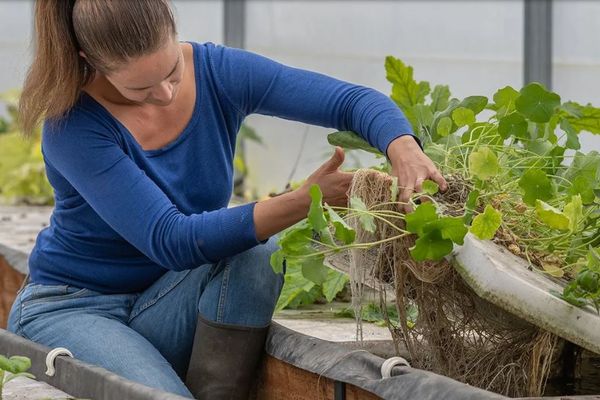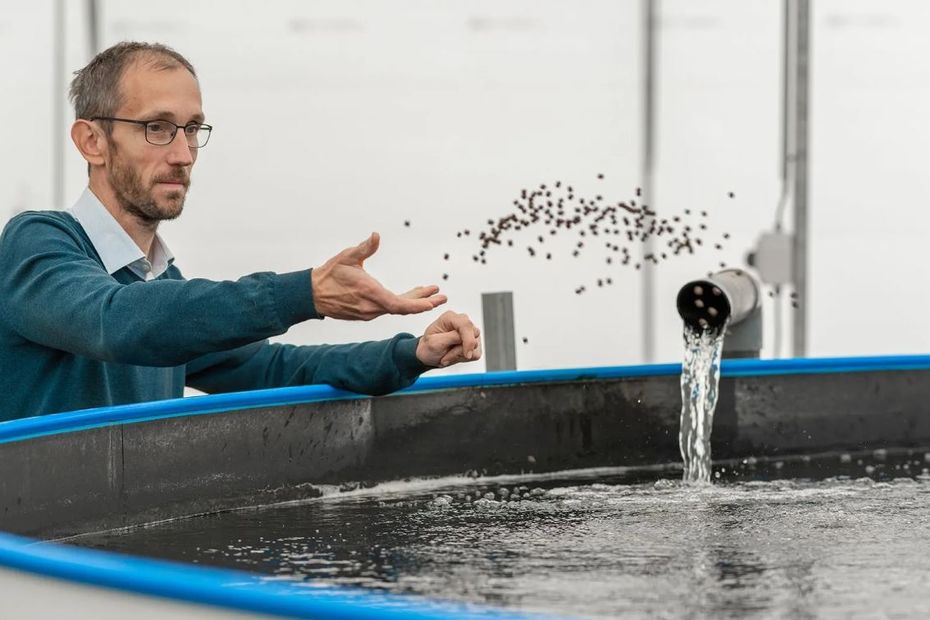For two years, in Moulins-sur-Tardoire near Angoulême, Benoit and Jehanne Desormeaux have been producing sturgeons and vegetables in aquaponics. A thousand-year-old agricultural technique where fish and plants flourish in symbiosis to the delight of environmentally conscious gourmets.
–
Obviously, in the Angoumois countryside, this large greenhouse of 2500 m² first intrigued local residents. Obviously, the chamber of agriculture has been shown, to put it mildly, more than skeptical of Jehanne and Benoit’s project. The latter is an accountant by training and, despite her diplomas in agronomy, Jehanne has obviously not reassured the supporters of conventional agriculture of the merits of their project. The Fish Garden or how to combine fish farming and market gardening in a harmonious and, nevertheless, very scientific collaboration. Let’s face it, the concept can be surprising.
Sturgeons in the Charente countryside … you had to think about it
•
© The Fish Garden
–
“We are in a closed circuit”
However, Jehanne and Benoit did not invent anything. The Aztecs called it a chinampa, a farming area in a lake environment. The Chinese were also great followers of aquaponics until the Cultural Revolution. Aquaculture, we know. Hydroponics is a method of cultivation without soil where the roots of plants are immersed in a water circuit where they find all the nutrients necessary for their growth. To put it simply, the poo of the sturgeons of Benoit, once filtered naturally, fertilizes the salads of Jehanne which give back to the fish a healthy water favorable to their development.
The fish vegetable garden, an aquaponic farm in Charente
–
The fish will provide the nutrient for our plants. It is the vector of everything that will happen thereafter. The fish will digest what is given to it and will provide the excreta. This excretion will be transformed by the bacteriological medium which will give nutrients to the plants. The plants afterwards will do filtration work, they will feed on this nutrient and will restore clean water to the fish. We are in a closed water circuit; fish, bacteriological environment, plants, each has its work in this balance, it is an ecosystem, each element is alive, each element is essential.

Jehanne monitors the growth and well-being of her vegetable garden on a daily basis.
•
© The Fish Garden
–
“We’re a bit like Martians”
In Moulins-sur-Tardoire, nearly 600 kilos of sturgeon wriggle in the ponds. The fish are harvested on demand and are prepared according to the Japanese tradition of ikejime which saves them stress and pain. Beyond their taste value, they can also be proud of having biologically fertilized the vegetables and aromatic plants of the farm. “I try as much as possible to be local, to make artisans work around our home”, explains Sandrine, a neighbor, “I avoid everything that is supermarkets and I find that it is a great initiative that is innovative. And even in terms of practicality, washing vegetables, it is a little faster because it is above ground. As a working mother, I only find advantages “. And, of course, no phytosanitary product is used on the farm.
The difference is that the root will find everything within its reach. As the water circulates, all the nutrients will come to it. We don’t call it treatments but treatments carried out with nettle slurry, garlic or broom slurry but we cannot do treatments otherwise it would kill the bacteriological system which is one of the engines. aquaponics.
The couple invested 340,000 euros in this agricultural dream. Apart from a subsidy of 12,000 euros, they hardly found any support, except that of their customers and now regulars. “I passed in front and I saw this big building. I was curious and I stopped once to see the production”, explains Jean-Michel, “I found very sympathetic young people, hyper motivated. I think that aquaponics is part of the circular economy and we should encourage it. However, I am scandalized to see that our policies and our administration are not helping them “. Despite this, Benoit is convinced that aquaponics is a real solution for the agriculture of tomorrow.
Today our activity is working very well: we produce vegetables, we produce fish. This is our second year of marketing, so it’s going to be a pivotal year for us. We have to wait until this year goes by so that we can get results. For the moment, we are not remunerated. The activity does not allow you to get out of wages but we hope to get there quickly to succeed in living off it. We are not here to earn hundreds and miles, but to pay for the work we do. We are a bit Martians but at the same time we are extremely respected because we are on an innovative and clean culture and we are in the same state of mind to satisfy customers on quality things.
A straw-earth building to store vegetables and welcome customers, a phyto-purification system, a heat sink, hedges to satisfy bees and birds, a smokehouse, a processing laboratory, an insect farm to feed the fish; there is no shortage of projects in the Potager des Poissons. Today, the French Federation of Aquaponics lists around 40 farms, including around 20 commercial farms.
–


